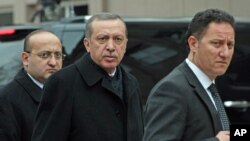ISTANBUL —
The Turkish prime minister Recep Tayyip Erdogan has called for an end to the long detention of hundreds of military officers accused of conspiring against the government. For the first time, Erdogan admitted it was having an effect on the army's capabilities. The comments come as Turkey is facing increasing instability with its neighbors.
Hundreds of serving and retired army officers are on trial or have been languishing in jail for years awaiting court cases for conspiracies against Erdogan's government. But the prime minister has voiced frustration at the lengthy legal process and admitted the damaging effect the situation has had on the military.
And with the prolonged crises in the region, namely in Syria and Iran, a weak military could put Turkey in a vulnerable position.
Gareth Jenkins, an expert on Turkish military affairs, says those concerns are well founded.
"You have had this disruption organizationally not just because personnel have been put in prison but also those who have not been put in prison are worried they might be next. And this has to be of concern as we look ahead to what's going to be happening with Syria," said Jenkins. "We have seen this major deterioration in Turkey's relations with all its southern neighbors, Iran also, and the situation in Iraq is very confusing. Turkey needs to have its military in top condition."
Analysts say Ankara was rocked by the resignation this month of a senior admiral who was tapped to take command of the Turkish navy. His resignation was reportedly in response to the mass arrest of senior naval officers in connection with an espionage plot.
Political scientist Cengiz Aktar of Istanbul's Bahcesehir University believes the prime minister's criticism of the judicial probes is part of an important realignment in Turkish politics.
"Since some time now the government and prime minister have been searching for a status quo with the military. In his mind, the demilitarization of the country is sufficiently done, and now it might be seen as a kind of trade off," said Aktar.
But Lale Kemal, a defense expert for the Turkish daily Taraf, worries the government and the country could pay a high price for any easing of its crackdown on the anti-democratic forces within the army.
"After the June 2011 elections, the government has given the break to all the military reforms. You have to ensure civilian democratic oversight of our armed forces, if you don't finish the reforms your military will always have an appetite in the future for making coup plans," said Kemal.
Since 1960, the Turkish army has forced four governments out of office. Some observers warn the culture for interfering with Turkish politics still exists in some quarters of the army. Earlier this month, corruption watchdog Transparency International strongly criticized Turkey for the lack of oversight of the armed forces. But with growing turmoil in the region, analysts say Erdogan's priority is to have powerful armed forces.
Hundreds of serving and retired army officers are on trial or have been languishing in jail for years awaiting court cases for conspiracies against Erdogan's government. But the prime minister has voiced frustration at the lengthy legal process and admitted the damaging effect the situation has had on the military.
And with the prolonged crises in the region, namely in Syria and Iran, a weak military could put Turkey in a vulnerable position.
Gareth Jenkins, an expert on Turkish military affairs, says those concerns are well founded.
"You have had this disruption organizationally not just because personnel have been put in prison but also those who have not been put in prison are worried they might be next. And this has to be of concern as we look ahead to what's going to be happening with Syria," said Jenkins. "We have seen this major deterioration in Turkey's relations with all its southern neighbors, Iran also, and the situation in Iraq is very confusing. Turkey needs to have its military in top condition."
Analysts say Ankara was rocked by the resignation this month of a senior admiral who was tapped to take command of the Turkish navy. His resignation was reportedly in response to the mass arrest of senior naval officers in connection with an espionage plot.
Political scientist Cengiz Aktar of Istanbul's Bahcesehir University believes the prime minister's criticism of the judicial probes is part of an important realignment in Turkish politics.
"Since some time now the government and prime minister have been searching for a status quo with the military. In his mind, the demilitarization of the country is sufficiently done, and now it might be seen as a kind of trade off," said Aktar.
But Lale Kemal, a defense expert for the Turkish daily Taraf, worries the government and the country could pay a high price for any easing of its crackdown on the anti-democratic forces within the army.
"After the June 2011 elections, the government has given the break to all the military reforms. You have to ensure civilian democratic oversight of our armed forces, if you don't finish the reforms your military will always have an appetite in the future for making coup plans," said Kemal.
Since 1960, the Turkish army has forced four governments out of office. Some observers warn the culture for interfering with Turkish politics still exists in some quarters of the army. Earlier this month, corruption watchdog Transparency International strongly criticized Turkey for the lack of oversight of the armed forces. But with growing turmoil in the region, analysts say Erdogan's priority is to have powerful armed forces.




